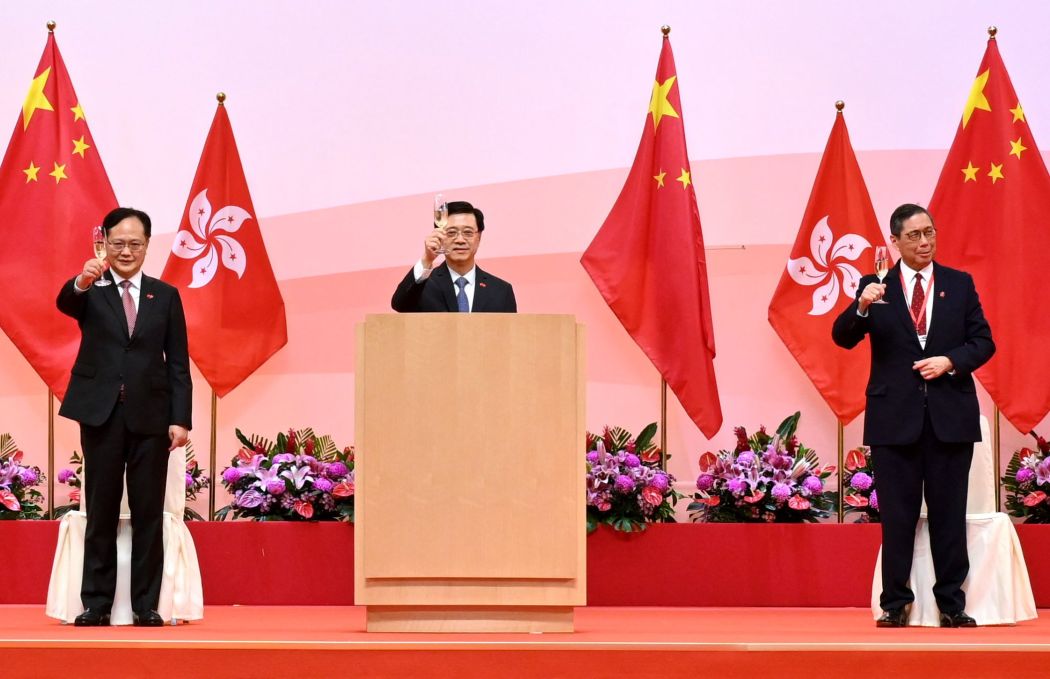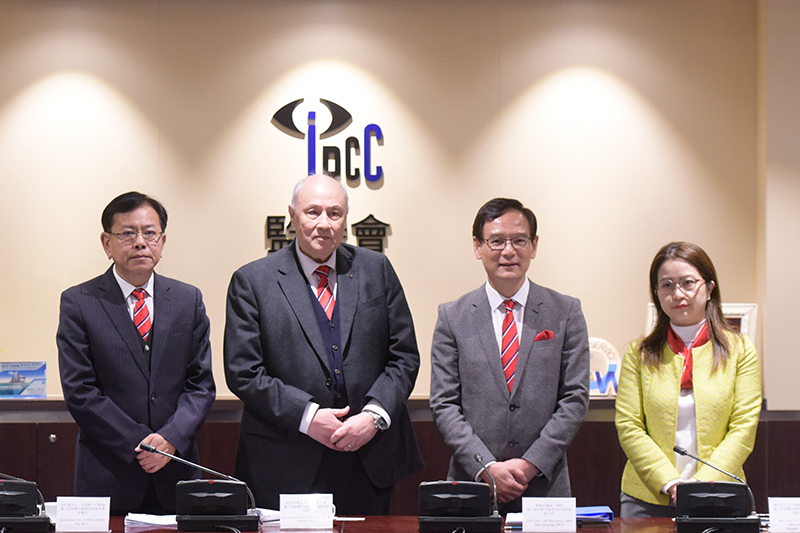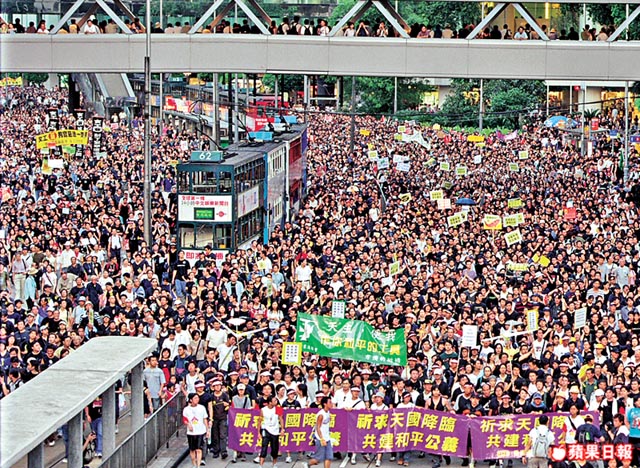The appointment of Secretary for Security John Lee as Chief Secretary for Administration, number two in the Hong Kong government, may be related to better preparing for upcoming elections which authorities apparently see as mainly a security issue.
Voting for the election committee sub-sector will be held on September 19 and for the Legislative Council on December 19.

Placing a former police officer in such a senior position indicates the nervousness of the Chinese Communist Party (CCP) as it imposes a new political system on Hong Kong. Not only will Lee bring security into most discussions within government, but he will also add an additional security voice to the vetting apparatus of senior CCP official Luo Huining.
The CCP is telling the people of Hong Kong, first, that it does not trust them to passively accept their reduced role in managing the city’s affairs. The distrust is mutual. According to one survey, just 18.7 per cent of the people trust the central government, only marginally higher than those who trust the Hong Kong government (17 per cent). The party is telling us that trust-building is not on the agenda.
The party is also telling the Administrative Officer (AO) grade of Hong Kong’s civil service that its self-described political skills have become irrelevant. The CCP has long perceived members of the grade as too insular, too local, too uninformed about mainland history and developments, and insufficiently loyal.
For this reason also the party has sidelined AOs in the process of vetting candidates in the upcoming elections. I expect further sidelining of AOs for other posts. Authorities may prefer trusted loyalists from the disciplined services (police, immigration, customs and excise), the leadership of which the central government controls directly. More loyal lieutenants heading civil service management and education may be on the cards. This could lead to the AO grade eventually losing its special position and/or even its separate identity.

The party is sending additional messages too. John Lee comes to the new post with a lot of baggage. For example, he was intimately involved in decisions about the extradition bill that led to the anti-government protests and unrest in 2019. Like other key government leaders, Lee failed to understand public sentiment at the time, provided misleading political risk assessments of the government’s proposed course of action, and likely participated in the decision to push the amendments through at all costs despite massive opposition from the public and the government’s own supporters.
He did apologise, it is true. But the party is communicating to the public that competence does not matter.
There is also Lee’s unstinting support for police conduct during the 2019 protests. Remember what we saw at the Yuen Long MTR station on the night of July 21 that year, when “white-shirted men” beat up returning protesters. As video investigations conducted by the NY Times, Amnesty International, and RTHK’s award-wining documentary 7.21: Who Owns the Truth? reveal, many questions remain.
The insipid investigation by the Independent Police Complaints Council did not resolve key issues such as, did the police collude with gangsters? Only law enforcement can answer that, the IPCC said. The police? Politically appointed John Lee?

Authorities have failed to conduct a thorough independent investigation into this and many other episodes of alleged police misconduct. Promoting John Lee or others involved without such an accounting lets us know that even a rudimentary level of accountability no longer matters. The appointment of John Lee is a slap in the face to those in Hong Kong who believe that government should be accountable and that Basic Law Article 43 means what it says.
It wasn’t always this way. On July 7, 2003, the Secretary for Health, Welfare, and Food resigned to take responsibility for blunders committed during the SARS outbreak. He took responsibility for confusing and misleading the public, failing to supervise the Director of Health and failing to adequately monitor the Hospital Authority, which had no contingency plan for large-scale outbreaks of infectious disease. The Secretary publicly apologised and the Hospital Authority Chairman also resigned. The public and Legco demanded nothing less.
Why did political accountability to the public matter then? First, Hong Kong’s elite were relatively united, agreeing that they could not ignore public opinion. After massive Article 23-related public protests, the largest in Hong Kong’s history, Regina Ip resigned (25 June). The Financial Secretary resigned the same day for a car-tax scandal. The CE accepted both resignations on July 16, 2003, nine days after the Secretary for Health had resigned.
Ominously, Gao Siren, head of China’s Liaison Office at the time, declared that the protests about Article 23 – which requires Hong Kong to pass its own security law – represented “a vehicle for subverting the political system” of the city.

Second, the central government, embroiled in Jiang Zemin-Hu Jintao politics and shocked by the protest and the ineffectiveness of the party’s operations in Hong Kong, took no observable follow up action. Rather, it left the traditional Hong Kong handlers in charge and continued with its policy of governing Hong Kong by controlling the commanding heights (the Chief Executive).
Third, trust in the Hong Kong government, badly shaken by the protests and SARS, quickly rebounded, perhaps because citizens perceived that the government was responsive to them. Fourth, these events occurred in a relatively benign geopolitical environment in which foreign politicians paid relatively little attention to Hong Kong.
From then until today accountability to the people of Hong Kong has atrophied. The elite no longer perceive that public opinion matters. From 2014 the CCP, more united under Xi Jinping, took more direct control of Hong Kong. Distrust of the government escalated, especially in 2019-2020. Geopolitical conflict and great-power rivalry embroiled Hong Kong.
The Legco elections are coming in December but many questions remain. Will people take part in our new political system? Will they vote, for example? How will people perceive the candidates selected for them? How will they perceive the new-look Legco filled perhaps with sycophants and careerists, as could happen? The party’s move to promote John Lee indicates that it is worried – and taking nothing for granted.
Support HKFP | Policies & Ethics | Error/typo? | Contact Us | Newsletter | Transparency & Annual Report | Apps
| HKFP is an impartial platform & does not necessarily share the views of opinion writers or advertisers. HKFP presents a diversity of views & regularly invites figures across the political spectrum to write for us. Press freedom is guaranteed under the Basic Law, security law, Bill of Rights and Chinese constitution. Opinion pieces aim to point out errors or defects in the government, law or policies, or aim to suggest ideas or alterations via legal means without an intention of hatred, discontent or hostility against the authorities or other communities. |
Help safeguard press freedom & keep HKFP free for all readers by supporting our team

More HKFP OPINION:
HKFP has an impartial stance, transparent funding, and balanced coverage guided by an Ethics Code and Corrections Policy.
Support press freedom & help us surpass 1,000 monthly Patrons: 100% independent, governed by an ethics code & not-for-profit.










